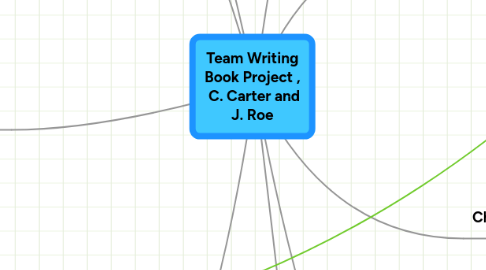
1. Personal Goals
2. Ch 3 Team Charters
2.1. Student Project Charter
2.2. Team Goals
2.3. measurable Goals
2.4. Individual commitment
2.5. Other Factors Affecting Performance
2.6. Resolving Impasse
2.7. Late Work and Missed Deadlines
2.8. Unacceptable Work
2.9. Links to Resources
2.9.1. High Performance Work Teams
2.9.2. Team Charter Template
2.10. Links to how to develope measurable goals and outcomes
2.10.1. Creating S.M.A.R.T. Goals
2.10.2. Developing Goals and Objectives
2.11. To Do List Application
2.12. HTW References
2.12.1. Managing Conflict
2.12.2. The Negative Person in a Meeting
3. Ch4 Getting Started with the Task Schedule
3.1. Assigning Tasks to Team Members
3.1.1. Motivation vs. Experience
3.1.1.1. Primary Task
3.1.1.2. Secondary, Advisory Task
3.1.1.3. Gendered Division of Labor
3.2. Scheduling the Tasks
3.3. Balancing the Workload
3.4. Technology and Tools for Task Schedules
3.4.1. Gantt Charts
3.4.2. Project-Management Software
3.4.3. Wikis
3.4.4. Gantt Charts: Microsoft project 2007
3.4.5. Free Wiki Space
3.5. Web Based Calendar Software
3.6. Identifying Major Tasks
3.6.1. Task Schedule
4. Ch6 Revising with Others
4.1. Revision Process
4.1.1. 4 Steps to Create a Constructive Feedback Culture
4.1.2. Understand Project Requirements
4.1.3. Listening and Negotiating
4.2. 2 Types of Revision
4.2.1. Feedback
4.2.2. Direct-Revision
4.2.3. Choosing a Method
4.2.4. Ground Rules for Revision
4.3. Providing Effective Feedback and Making Good revisions
4.4. Technology for Collaborative Revising
4.4.1. E-mail
4.4.2. Commenting Features
4.4.3. Instructions for Word on Tracking Changes
4.4.4. Collaborative Revision with Google Docs
4.4.5. Example of Wikis for revision.
4.5. HTW References
4.5.1. Listening (pg. 307-309)
4.5.2. Planning (pg. 73)
5. Ch 8 Troubleshooting Team Problems
5.1. Problems with Showing Up and Turning in Work
5.1.1. A teammate misses a meeting
5.1.2. A teammate misses a deadline
5.1.3. A teammate turns in incomplete work
5.1.4. A teammate turns in poor-quality work
5.1.5. A teammate disappears completely
5.2. Problems with Personal Interactions
5.2.1. My team doesn't trust me to do good work.
5.2.2. My team isn't listening to me -- or is taking a direction I disagree with
5.2.3. Other team members are not committed to a high-quality product
5.2.4. My teammates do and say things I find disturbing or demeaning
5.2.5. A teammates criticize my work exessively
5.3. Problems with Revison
5.3.1. Team members are not open to revisions to their work -- or team members ignore the suggestions I make for revision
5.3.2. My team is destroying my work
5.3.3. Team members are not giving adequate feedback
5.3.4. I'm not sure how to give good feedback to team members
5.4. HTW References
5.4.1. Conflict (pg. 74-75)
6. Ch1 Collaboration
6.1. Methods
6.1.1. Face to Face
6.1.2. Divided
6.1.3. Layered
6.1.4. Essentials
6.1.4.1. Task Schedule
6.2. Links
6.2.1. http://www.howdesign.com/article/collaboration/
6.2.2. http://teaching.berkeley.edu/bgd/collaborative.html
6.3. HTW References
6.3.1. Collaborative Writing
6.3.2. Active Listening
7. Ch2 Project Management
7.1. Project Manager
7.1.1. Task Schedule
7.1.2. Meeting Minutes
7.1.3. Meeting Agendas
7.2. Links
7.2.1. http://careerplanning.about.com/cs/communication/a/minutes.htm
7.2.2. http://www.meetingwizard.org/meetings/meeting-agenda.cfm
7.3. HTW References
7.3.1. Project Management
7.3.2. Progress Reports
7.4. Application
7.4.1. D#7, HW2 Application Evaluation/Link:Teamwork Project Manger:http://www.teamworkpm.net/home
8. Ch 5 Constructive Conflict
8.1. Constructive Conflict Engagement
8.2. 5 Key Strategies to Creating a Constructive Infrastructure for Your Team
8.2.1. Clarify roles and resposibilities
8.2.2. Include Revision and Implement Revisions in the Task Schedule
8.2.3. Ground Rules on Conversation
8.2.4. Preplan Impasse Resolution
8.2.5. Establish Team Priorities
8.3. HTW References
8.3.1. Conflict HTW (74)
8.3.2. Consensus HTW (96)
8.4. Managing Conflict resources
8.4.1. 10 Tips for Managing Conflict
8.4.2. Positive Steps for Managing Conflict
8.4.3. Managing Conflict Creatively
8.4.4. Managing Team Conflict
9. Ch7 Communication Styles and Team Diversity
9.1. The Benefits of Diverse Teams with a link to 3 Reasons to create diverse work teams.
9.2. How Differences in Communication Norms Can Cause Interpersonal Conflict
9.3. Understanding Norms
9.4. Competitive vs. Considerate Conversational Norms
9.4.1. How Can Competitive Speakers Adopt a More Considerate Style?
9.4.2. How can Considerate Speakers Adjust to Competitive Conversations?
9.5. Self-Promoting vs. Self-Deprecating Speech
9.6. Gender and Communication Norms
9.7. HTW References
9.7.1. Listening (pg. 307-309)
9.7.2. Communicating Globally (pg. 229-230)
